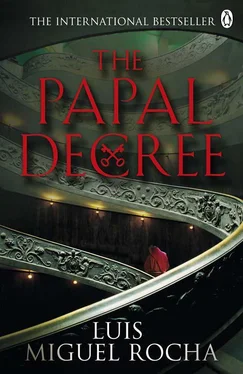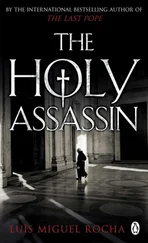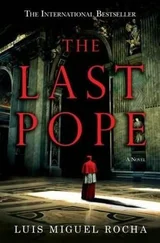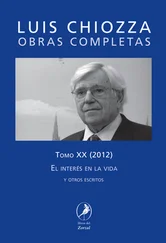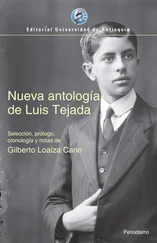Luis Rocha - Papal decree
Здесь есть возможность читать онлайн «Luis Rocha - Papal decree» весь текст электронной книги совершенно бесплатно (целиком полную версию без сокращений). В некоторых случаях можно слушать аудио, скачать через торрент в формате fb2 и присутствует краткое содержание. Жанр: Триллер, на английском языке. Описание произведения, (предисловие) а так же отзывы посетителей доступны на портале библиотеки ЛибКат.
- Название:Papal decree
- Автор:
- Жанр:
- Год:неизвестен
- ISBN:нет данных
- Рейтинг книги:4 / 5. Голосов: 1
-
Избранное:Добавить в избранное
- Отзывы:
-
Ваша оценка:
- 80
- 1
- 2
- 3
- 4
- 5
Papal decree: краткое содержание, описание и аннотация
Предлагаем к чтению аннотацию, описание, краткое содержание или предисловие (зависит от того, что написал сам автор книги «Papal decree»). Если вы не нашли необходимую информацию о книге — напишите в комментариях, мы постараемся отыскать её.
Papal decree — читать онлайн бесплатно полную книгу (весь текст) целиком
Ниже представлен текст книги, разбитый по страницам. Система сохранения места последней прочитанной страницы, позволяет с удобством читать онлайн бесплатно книгу «Papal decree», без необходимости каждый раз заново искать на чём Вы остановились. Поставьте закладку, и сможете в любой момент перейти на страницу, на которой закончили чтение.
Интервал:
Закладка:
Everything had its time, rules, and discipline. A fault, whatever it was, required a punishment, and the slap in the face that split her lip was not itself the punishment, but a warning.
These outbursts could be avoided if she followed the rules. She knew them backward and forward. She had no excuse to disobey what had been determined.
He looked at the book and read the title, The Man Who Never Existed, by one Hans Schmidt. A heresy in two hundred pages that pretended to point out the road to salvation. He couldn’t understand it. God showed them the way. Why did she have to look for other ways? He was too merciful. Some people needed to learn the hard way how to stay on His track.
He threw the book in the fireplace, which was burning with a hot flame, and opened his briefcase. He took out the last envelope he had received. Inside there was a letterhead with round strokes in large letters. On the top line he read AD MAIOREM DEI GLORIAM. On the next line was Deus vocat, followed by the name of the chosen ones. Normally there was one name, rarely two. This time he read two: Yaman Zafer and Sigfried Hammal.
He threw the letter and envelope into the fireplace.
He got up and went to see her. She was kneeling by the bed to pray. The power of prayer. He didn’t interrupt her, since nothing is more sacred than the direct contact with God through prayer. To ask forgiveness, grace, an idea, a suggestion, this was the privileged, sacred channel that should never be interrupted. He waited with his arms crossed, staring at her. As soon as she made the sign of the cross, signaling the end of the communication, she got up and lay down in bed. He went to a chest at the foot of the bed and opened a drawer. His back was turned to her, so he didn’t see her eyes fill with tears, which she quickly wiped away. Her shaking lessened, then stopped, for better or worse. He looked at her and came over. He carried a syringe containing a yellow liquid.
‘Give me your arm,’ he ordered.
She wouldn’t. He pulled her to the edge of the bed and inserted the needle. He slowly emptied the syringe and waited. He looked at his watch. Two minutes later she’d be sleeping like a baby. Breathing quietly. A sleep without dreams. A holy repose. He undressed, folding and hanging each piece of clothing on a chair. He got on the bed, on top of her, raised her nightgown, opened her sleeping legs, and entered her. He went in and out in a frenzy, and she never opened her eyes or uttered a sign. A few minutes later he finished, with a few drops of sweat on his face. She remained asleep, unchanged, with the same quiet breathing.
He left her asleep and went to look at the mail. A box in the door with a lock only he had the key to. There was an envelope in it, as he suspected. A cold smile, if it could be called that, spread over his lips. He opened the box and took it out. The same letterhead across the top and then the name of those chosen by God to join Him. He had no time to waste. This time there were three names.
18
‘Tell me the story straight,’ Gavache asked as he leaned his head against the front passenger seat.
Jean-Paul was driving the inspector and the two Italians into the city.
‘Saint Ignatius of Loyola was the first to use that saying in the Society of Jesus, which he founded. Ad maiorem Dei gloriam. For the greater glory of God,’ Rafael explained.
‘Saint,’ Jacopo mocked.
‘Are you telling me the Jesuits go around killing people?’
‘No, I’m telling you that a Jesuit killed two people — ’
‘Three,’ Jacopo interrupted to correct him.
Gavache’s eyes almost jumped out. An exasperated Rafael stared at Jacopo with disdain.
‘Three? The count has now gone up to three? Did you hear that, Jean-Paul?’ He looked at Rafael like an inquisitor.
‘Yes, Inspector. Someone’s hiding information.’ Jean-Paul joined the party.
‘That’s exactly what I think, Jean-Paul. Somebody’s making fun of us. What can you expect from those who preach morality? They only preach morality when they’re being immoral, right? But who’s fooling us, Jean-Paul?’ he looked around and stared at the passengers behind him.
Jean-Paul didn’t answer Gavache’s rhetorical question since he knew the inspector could be dramatic when necessary.
‘I’m sorry, Inspector. I didn’t remember that detail,’ Rafael began uncomfortably. He hated to apologize. Difficult for someone who normally did as he pleased… in the name of God. Jacopo had to learn to keep his mouth shut, but this could wait. ‘The third homicide, which chronologically was actually the first, was a Catholic priest in the Church of the Holy Sepulcher in Jerusalem.’
‘When?’ demanded Gavache brusquely.
‘Three days ago.’
‘Name?’
‘Ernesto Aragones. He was the administrator of the Catholic wing,’ Rafael clarified. He was still on shaky ground.
‘Why do you say the Catholic wing?’
‘Because the Church of the Holy Sepulcher is administered by six distinct churches.’
‘Did you hear that, Jean-Paul?’
‘A real mess, Inspector.’ Jean-Paul kept his eyes on the road.
A light rain continued to fall, glazing over the windshield irritatingly. The wipers dirtied the windshield more than cleaning it off, forcing Jean-Paul to double his focus.
‘How can six churches fit into one?’ He turned around, facing the road. Spending so much time twisted around to the back was giving him a crick in the neck.
‘Do you know the importance of this church?’
Gavache didn’t answer, as if he were thinking about it, but Rafael realized that he was just irritating him.
‘It’s the most important.’
‘Exactly. It marks the place where Jesus was crucified and buried.’
‘Supposedly,’ Jacopo added, as if that one word made all the difference.
‘I see your friend is not very Catholic,’ Gavache offered, amused but not smiling.
‘Not at all Catholic,’ Jacopo added. ‘Not a drop.’
‘So why’d you come?’
Jacopo didn’t know what to say. He’d rehearsed answers for every possible question, but he didn’t know how to answer that.
‘Jacopo is an eminent historian at the University of Rome, La Sapienza,’ Rafael said. ‘He came because he was a friend of Yaman Zafer.’
‘And of Sigfried Hammal?’
‘I think we met at a conference in ’85, but it wasn’t important enough to remember,’ Jacopo offered in a timid voice.
‘And this Ernesto Aragones,’ Gavache insisted.
‘I’ve never heard of him.’
Gavache was silent a few moments. The only sound was the car moving on the street.
‘Where were we?’ he asked after some time.
‘How is it six churches can fit in one?’ Jean-Paul remembered, as if it were nothing.
‘Exactly. How?’ Gavache repeated.
Rafael explained. ‘As we said, this church is the most important of all the ancient churches, for historical reasons.’ He stared hard at Jacopo. ‘A treaty worked out with the Ottomans in the 1850s divided the custody of the church and adjacent residences between Roman Catholics, Greek Orthodox, Armenians, Copts, Syrians, and Ethiopians. They named a neutral watchman.’
‘Watchman?’ Gavache asked.
‘The person who locks and unlocks the church,’ Rafael explained. ‘They named a Muslim watchman.’
‘What a happy world in which all the religions live together in peace,’ Gavache said sarcastically.
Rafael ignored the remark. ‘This treaty is called the Status Quo.’
Gavache absorbed the historical information and wet his lips.
‘Now the million-dollar question.’ He permitted himself a few seconds of suspense and turned toward the back. He massaged his neck to ease the pain. He wanted to see their faces when they replied. ‘Did Ernesto Aragones, Yaman Zafer, and Sigfried Hammal know each other?’
Читать дальшеИнтервал:
Закладка:
Похожие книги на «Papal decree»
Представляем Вашему вниманию похожие книги на «Papal decree» списком для выбора. Мы отобрали схожую по названию и смыслу литературу в надежде предоставить читателям больше вариантов отыскать новые, интересные, ещё непрочитанные произведения.
Обсуждение, отзывы о книге «Papal decree» и просто собственные мнения читателей. Оставьте ваши комментарии, напишите, что Вы думаете о произведении, его смысле или главных героях. Укажите что конкретно понравилось, а что нет, и почему Вы так считаете.
